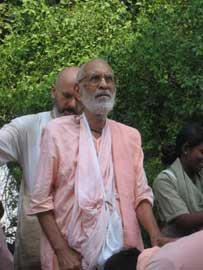Vrndavana: October 21, 2005
Sri Srimad Bhaktivedanta Narayana Maharaja
[A class from the Kartika lecture series on Srila Visvanatha Cakravarti Thakura 's Madhurya Kadambini.]
[The following class was given during the 2005 Vraja-mandala parikrama. On that day the devotees had visited the holy pastime place called Maan-sarovara, and Srila Narayana Maharaja gave hari-katha there. Then in the evening, at about 5:00 pm, he gave his regular class at Gopinatha Bhavan on the shore of Yamuna . In that class, attended by about 1,000 devotees from all over the world, he discussed more about Maan sarovara, and he also continued his lecture course on Srila Visvanatha Cakravarti Thakura's book, “Madhurya Kadambini.” This is not the first class he gave in this course series:]
Even though you all returned from parikrama after 3:30 pm, still you have assembled here to hear hari-katha. Today, we went to Maan-sarovara and we told some hari-katha there. We explained how Srimati Radhika did maan (entered a sulky mood) in rasa-sthali, and from there She went through Maan gali, Dan gali, Prema gali and Kunja gali. Weeping in anger, She then went to the very solitary place known as Maan-sarovara. Then, Sri Krsna somehow discovered Her whereabouts and went there to pacify Her.
Maan has been described by different persons in many different ways. One instance of maan is given by Srila Visvanatha Cakravarti Thakura. He tells how Krsna dressed Himself as a brahmana boy and came to Srimati Radhika's house like a sannyasi. Begging donations He called out, “Bhiksam dehi, bhiksam dehi. Oh, please give Me charity. Give Me charity.” Jatila looked at Him and thought, “If we don't give the sannyasi a donation and he leaves empty-handed, it will be a great misfortune for us. All our cows may die, and my son may also die.”
She stepped forward to give the sannyasi a donation of grains and so on, but He refused to take from an old woman. Jatila then told Lalita, “Oh, call my daughter-in-law. She should give bhiksa.”
Radhika objected, saying, “I don't deal with other men.” Jatila, Kutila, Lalita and Visakha cajoled Her, and thus She was forced to give the donation. She took a plate in Her hands and piled it high with rice, flour and other items. She came to the door and offered it to the sannyasi, but he said, “Oh Radha, I am not interested in these items. I did not come here for this donation. I came to take Your sulky mood. Please donate it to Me and be pleased with Me.”
Realizing now that this sannyasi was Sri Krsna Himself, Srimati Radhika smiled. She threw everything on His head that was on the plate, and laughing, She went inside. In this way all Her maan was finished. So, maan is of great importance in our bhakti literatures.
Now we will speak about Madhurya Kadambini. If an aspiring sadhaka (spiritual practitioner) comes to the lotus feet of Guru and takes diksa and siksa (initiation and relevant spiritual instructions), he can then enter into the realm of bhajana (devotional activities).
There are two types of bhajana – nisthita-bhakti and anisthita-bhakti. The first type is nisthita – steady devotional service. In this stage, the disciple will not be weak in his bhajana. He continues his bhajana without any fear of falling down. The second type is anisthita bhakti – unsteady devotional service. In this stage the disciple is plagued by many material desires coming in his heart. Srimad Bhagavatam has described this:
nasta prayesu abhadresu
nityam bhagavata-sevaya
bhagavaty uttama-sloke
bhaktir bhavati naisthiki
[“By regular attendance in classes on the Bhagavatam and by rendering of service to the pure devotee, all that is troublesome to the heart is almost completely destroyed, and loving service unto the Personality of Godhead, who is praised with transcendental songs, is established as an irrevocable fact.” (Srimad-Bhagavatam 1.2.18)]
This is anisthita bhakti (unsteady devotional service). Srila Visvanatha Cakravarti Thakura explains that anisthita bhakti is of six types: utsaha-mayi, ghana-tarala, vyudha-vikalpa, visaya-sangara, niyamaksama and taranga-rangini. I will explain them, one by one.
The first type of unsteady bhakti is utsaha-mayi. Utsaha means enthusiasm. When the student starts his studies, the teacher will encourage him by saying, “Oh, you are so good, so good. You are doing very nicely.” After a few days the student thinks, “Oh, now I'm such a big scholar. I know everything.” He is now so enthusiastic. Previously he was afraid to go to school, and now he takes his books and runs to school with great enthusiasm. In the same way, when the aspiring sadhaka first comes to the path of bhakti, he approaches Gurudeva and accepts harinama. Gurudeva says, “Oh, you cannot chant 64 rounds? No problem. Just do as many as you want. If somehow you can do 16 rounds, your material attachments will be destroyed and very quickly you will attain love for the lotus feet of Krsna.” The disciple then becomes very enthusiastic and happy with his chanting and other duties, and he thinks, “Yes, I have started to do bhajana.”
We are just like this. Even in our present stage we think, “I'm really doing bhajana now – fully.” Somebody may be chanting one lakh of harinama (100,000 names or 64 rounds), but when the Guru instructs or chastises him, pointing his finger and telling him what he is doing wrong, his eyes open up in surprise. Gurudeva tells him, “Oh, you have so many desires and so much anger in your heart. You should follow the first verse of Upadesamrta – vaco vegam manasa krodha vegam. You should control your mind and your senses, your tongue, belly and genitals. And you should follow the second sloka – atyaharah prayasas ca. Don't over-eat, don't over-collect and don't over-endeavor for material things.”
Then the disciple thinks, “Oh my God, I'm not doing any bhajana at all. I haven't even started,” He understands his position for some time, but later he thinks, “I am a great scholar, so I don't need to go to Guru. I will just do bhajana on my own. There is no need to go to Guru.” And he takes off. In this way, the new devotee is enthusiastic in the beginning, and later he becomes discouraged and his enthusiasm weakens. In the stage of bhajana-kriya, this is the type of unsteady bhakti called utsaha-mayi.
The second type is called ghana-tarala. A new student will start to study the Vedic scriptures. When he understands something he is enthusiastic, but when he doesn't understand because the subject matter is too difficult, he loses his enthusiasm and becomes upset. In the same way, in this stage the new devotee may sometimes practice the limbs of bhakti very enthusiastically – his practice is very 'thick'. And sometimes, if he meets some obstacles, he experiences weakness and his practice of bhakti becomes very 'thin'.
You should realize this fact.
Sometimes the study of many scriptures, the endeavor to remember all of the subjects therein, and the endeavor to learn many verses also become obstacles in bhakti. For example, someone who remembers many, many verses from scriptures, and also knows so many things from reading and hearing the scriptures, may be plagued by lust, anger and pride. Have his material desires left him or not? Does he have pride or not? Is he greedy for association with women? Is he still anxious for his own name and fame?
We will have to consider whether or not we have acquired the four symptoms of:
trnad api sunicena
taror api sahisnuna
amanina manadena
kirtaniyah sada harih
[“One can chant the holy name of the Lord in a humble state of mind, thinking himself lower than the straw in the street. One should be more tolerant than the tree, devoid of all sense of false prestige and ready to offer all respects to others. ln such a state of mind one can chant the holy name of the Lord constantly.” (Siksastaka 3)]
Are you giving respect to all others? Are you demanding respect for yourself? You will have to look at all these things. You may have read many, many books and may have memorized so many verses, but if lust and anger do not go from your heart, how can suddha bhakti (pure bhakti) come? How can we enter into the verses? And how can we understand the scriptures?
We have to follow Srila Rupa Gosvami and Srila Raghunatha dasa Gosvami. Srila Raghunatha dasa Gosvami has stated in Manah-siksa:
pratisthasa dhrsta svapaca-ramani me hrdi natet
katham sadhuh-prema sprsati sucir etan nanu manah
sada tvam sevasva prabhu-dayita-samantam atulam
yatha tam niskasya tvaritam iha tam vesayati sah
[“O mind! How can pure divine love appear in my heart as long as the shameless dog-eating outcaste woman of the desire for prestige is audaciously dancing there? Therefore, always remember and serve the immeasurably powerful commanders of the army of Krsna, the beloved devotees of the Lord. They will at once banish this outcaste woman and initiate the flow of immaculate vraja-prema in your heart.” (Manah-siksa, verse 7)]
That pratistha, desire for name and fame, is like a dog-eating prostitute dancing in the heart, and mukti-vyaghra, the desire for impersonal liberation, is like a tigress.
So consider how much bhakti you actually have. When women see men, does lust come? When men see women, do they feel lust? You must consider, “When my name and fame is checked by someone, do I become angry with that person? Do I have pride?” You must look at yourself and think about this. If you have these faults, how can bhakti come? Yours is then only a shadow of bhakti. Hearing about all these considerations, you must examine your heart and think, “Oh, I don't have bhakti.”
If we consider all these things, we become hopeless – this is our nature. So think about this. You have been hearing so much hari-katha and have lived for so many years with your Guru. Why do you still have so many material desires? How is it possible that the desire to marry is still in your heart? You should already know scripture and you must have attained some renunciation.
vasudeve bhagavati
bhakti-yogah prayojitah
janayaty asu vairagyam
jnanam ca yad ahaitukam
[“By rendering devotional service unto the Personality of Godhead, Sri Krsna, one immediately acquires causeless knowledge and detachment from the world.” (Srimad-Bhagavatam 1.2.7)]
When pure (suddha) bhakti enters the heart, one automatically attains jnana – knowledge of krsna-tattva, and vairagya – detachment from material enjoyment. When we are still beset by lust, anger and pride, we must ask ourselves, “Where am I? What is my position? Oh, I feel hopeless.”
Twenty to twenty-five years have already passed, and still this anger and lust and desire for fame have not left you? These things must be dispelled.
When we consider our position we become a little hopeless. In this regard, Srila Rupa Gosvami has written in Stava Mala:
pracinanam bhajanam atulam duskaram srnvato me
nairyasena jvalati hrdayam bhakti-lesalasasya
visva-dricim aghahara tavakarnya karunya-vicim
asa-binduksitam idam upety antare hanta saityam
[“I am very weak and lazy to do even the smallest devotional service. Therefore, when I hear of the peerless and difficult-to-perform services performed by the great devotees in ancient times, my heart burns with despair. On the other hand, O Lord, O killer of Aghasura, when I hear that Your waves of mercy splash everyone, from the demigod Brahma down to the most insignificant creature, and even to the demon Aghasura who was the embodiment of sin, then my heart becomes sprinkled with a cooling drop of hope.”]
The meaning of this prayer is as follows: “Alas! Seeing the sadhana of the previous great practitioners of bhakti, I have become hopeless.” We have only one hope. What is that? The mercy of Sri Caitanya Mahaprabhu is flowing everywhere, and even one drop can drown us. Srila Gaura Kisora dasa Babaji Maharaja and Srila Raghunatha dasa Gosvami performed astonishing austerity. The detachment of Gaura Kisora dasa Babaji was very severe. Before him there were many devotees performing austerities for thousands upon thousands of years – and look at us in comparison.
Think about this. What are you doing? Now it is the month of Kartika and we are eating so many delicious foods, up to our neck and even more; and we take rest and drink and enjoy in many ways. We are hearing beautiful kirtanas. Where is the severe sadhana? Where? Therefore think, brothers and sisters. Leave your pride, try to gain victory over your lust, and try to do bhajana of Krsna. There is no other way to achieve this most elevated bhakti.
Therefore, stay with the Vaisnavas; never leave them. In their association you will be disciplined and protected. Study our books. Listen carefully and take these words in your heart. Following the Vaisnavas you should lament, “Oh, my pride and lust have not left me. Fie on me, fie on me!” You should think like this. Look at yourself and lament for your condition. Only in this way can you give up all these bad qualities. Srila Visvanatha Cakravarti Thakura wrote all this, and now I'm just repeating a shadow of what he wrote.
The third type of unsteady bhakti is called vyudha-vikalpa, oscillation of the mind. A person accepts diksa and siksa from Guru and starts his bhajana. At that time so many contrary ideas run through his mind. He thinks, “Why should I do bhajana alone? After all, I have my family. My Gurudeva will give Vaisnava diksa to my father, mother, wife and children. I will build a small temple in my home, and there we will serve God together. I will do bhajana and my family members will also do bhajana.”
But then he reconsiders, “Hold on, this is not a good idea. After all, there were many great devotees like Sri Narada Rsi, Srila Rupa and Sanatana Gosvamis, Srila Raghunatha dasa Gosvami and others who left their homes and went to live in Vrndavana, Navadvipa, Jagannatha Puri or any of Lord Sri Krsna's other pastime places. If I stay with my family members, my material desires will continue to plague me. Better I leave my family and go to live in Vrndavana. I don't want to live in Western countries, or anywhere other than Vrndavana. Where will I live there? I will build a room by the side of Seva Kunja, and from my room I will be able to look out at Seva Kunja. Living like this, my life will be successful.” Both men and ladies think in this way.
And then, when he thinks about leaving home, his mind oscillates again. He thinks, “Oh, how can I leave them? After all, I still haven't fulfilled all my material desires. To leave in an immature state is not good. Therefore, to fulfill all my material desires I will continue to live with my family. When I am satisfied fully, my mind will automatically give up these attachments and then I will leave home. Why should I go now? When I'm old, then everything material will automatically no longer interest me.”
He thinks like this, and then again he wonders, “Should I leave now and take sannyasa, or should I wait a few days? Actually, it will be good if I stay for a little while longer.”
Lord Kapiladeva has warned, “Beware! Maya was created by the Lord Himself and has come to you in the form of a young woman, under the pretext of serving you. She is beautiful and seems to be very sweet, and she serves a lot. But you should understand that actually she is pulling you to your death.” She is like a blind well covered with grass. A blind well looks very nice on top, but inside it is full of suffering. She is like an oil well that has caught on fire. There are many oil wells in and here in . Kerosene and petrol oil come from there, and if there is fire, as soon as it touches the oil it spreads everywhere. Women should understand this is for men, and men should understand it for women.
By nature ladies are very sweet, but after some time they become ferocious, like Durga. In a second, a lady can plunder your wealth and cut off your head. And men are the same. Of course, this does not apply to the Vaisnavis who are absorbed in bhajana, like Sita Thakurani, Malini Devi and Gangamata Gosvamini. The entire world worships them. Think about all these things.
When we hear about these examples from sastra, we should have faith that family life is like a blind well covered with grass. Understand that it is a mirage, a false impression. There is no happiness in that association. Even if there is any so-called enjoyment, then diseases like TB or cancer also come. People drink wine to be happy, but when one drinks too much, he gets cancer of the liver and dies or goes mad. We must have strong faith and understanding that this tendency to enjoy material happiness is the cause of all miseries and sufferings.
Srimad-Bhagavatam tells the history of Bharata Maharaja. We should think like him. He ruled the entire Earth and enjoyed material opulence for many thousands of years. He was still in his youth when he left his kingdom, beautiful wife and affectionate children to do bhajana. He left them as we leave stool after passing. It was very difficult to renounce them, but he left everything.
Listening to such examples, the aspiring sadhaka thinks again and tries to leave household life. He decides, “Oh, I will not live in this world.” Ladies think the same, “I will not stay in worldly life.” But then again they consider other examples from scripture, “Oh, alas! Alas! I want to leave home, but it is such a great sin to leave my old parents all alone. Who will take care of them? And now I have small children and a beautiful wife. What will happen if I leave them? They will all be helpless. If my father dies in grief, this sin will come on my head. It will be my fault. My wife is very innocent and does not know anything of worldly matters. My children are very young – who will look after their education and maintain them? They will become orphans with no one to protect them. How will they live without me?”
Thinking like this, the aspiring sadhaka's mind oscillates. First he decides to leave the house, but now his previous determination to renounce everything is destroyed. He thinks, “Oh, it is so unfair to leave old parents and small children. It's not right.” Then his mind changes again: “Oh, I will go. My parents and my children and wife will somehow live without me. They won't die.” Then he reconsiders, “Oh, it is alright if I stay. My mind is still full of material desires. It is not only because of my old parents, wife, and children. I have just started a new business with many new shops, and if I leave them they will fail and I will become a beggar. I will have to go on the street begging alms, simply living as a beggar.”
In this way, the mind of a householder, who cannot decide what to do, oscillates back and forth. Lord Kapiladeva explains that because the householder is always attached to the objects of the senses – house, wife, children and wealth – his mind is always disturbed.
What to speak of householders, even those who entered the renounced order, accepting sannyasa and saffron cloth, cannot keep their vows. I know so many people who left their homes and were previously doing dandavat parikrama, wearing only one cloth in the winter and walking in wooden sandals – and today, where are they? They have left bhakti completely, and have no connection with bhajana, or with Guru and Vaisnavas. They have returned to their houses and have married again. I have seen thousands of people come and go like this.
This is called vyudha-vikalpa, indecision or oscillation of the mind. I will tell more, later. Oh, my brothers and sisters; don't be angry with me. The words I am speaking may pinch, but these are not my own words. I am just speaking what Srila Visvanatha Cakravarti Thakura has written.
Translator: Radhika dasi
Editor: Vicitra dasi









